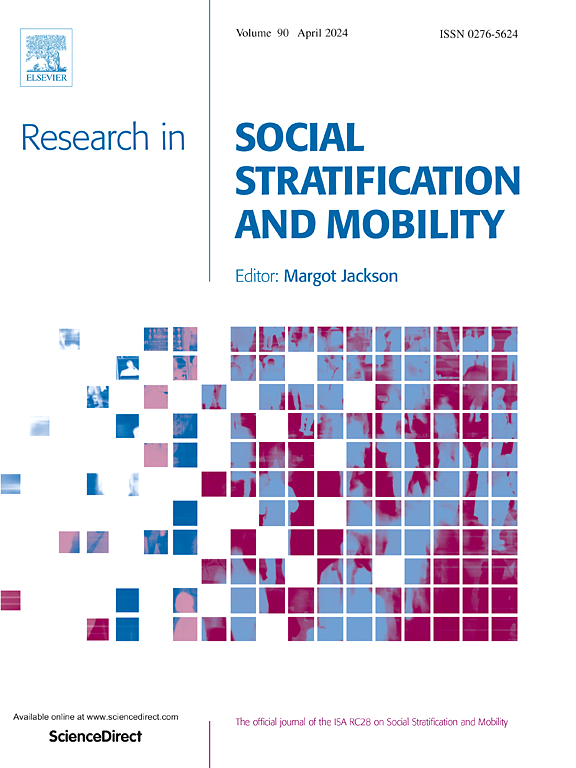感知社会流动性与健康指标的关系:2017 - 2021年中国综合社会调查结果
IF 2
1区 社会学
Q1 SOCIOLOGY
引用次数: 0
摘要
本研究利用2017年、2018年和2021年的中国综合社会调查数据(N = 31,262),研究了感知的代际和代内社会流动性与健康指标(即自评健康、生活满意度和抑郁症状)之间的关系。多项式回归和响应面分析表明,代际和代内社会流动性与所有三个健康指标之间存在一致的关联。认为社会流动性向下的人比认为社会流动性向上的人的健康状况更差,但与不流动的人相比,两组人的健康状况都更差。在行动不便的人中,主观社会地位与这些健康指标之间的关系呈倒 U 型,健康指标最初上升到一个高峰,然后随着主观社会地位的提高而略有下降。这项研究首次证明了在中国社会文化背景下,主观社会地位对健康的影响,并有可能对传统的 "越多越好 "的社会经济地位模式提出挑战。本文章由计算机程序翻译,如有差异,请以英文原文为准。
Associations of perceived social mobility with health indicators: Findings from the Chinese general social survey from 2017 to 2021
This study examined how perceived intergenerational and intragenerational social mobility would be associated with health indicators (i.e., self-rated health, life satisfaction, and depressive symptoms) using data from the 2017, 2018, and 2021 waves of the Chinese General Social Survey (N = 31,262). Polynomial regression and response surface analyses revealed consistent associations of perceived intergenerational and intragenerational social mobility with all three health indicators. Individuals who perceived downward social mobility reported worse health outcomes than those who perceived upward social mobility, but both groups reported poorer health outcomes compared to immobile individuals. Among immobile individuals, the relationship between subjective social status and these health indicators followed an inverted U-shaped pattern, with health indicators initially rising to a peak and then slightly decreased as subjective social status increased. This study offers the first pieces of evidence for the health consequences of perceived social mobility under the Chinese sociocultural context and has potential to challenge the conventional “more is better” model of socioeconomic status.
求助全文
通过发布文献求助,成功后即可免费获取论文全文。
去求助
来源期刊
CiteScore
7.80
自引率
6.00%
发文量
46
期刊介绍:
The study of social inequality is and has been one of the central preoccupations of social scientists. Research in Social Stratification and Mobility is dedicated to publishing the highest, most innovative research on issues of social inequality from a broad diversity of theoretical and methodological perspectives. The journal is also dedicated to cutting edge summaries of prior research and fruitful exchanges that will stimulate future research on issues of social inequality. The study of social inequality is and has been one of the central preoccupations of social scientists.

 求助内容:
求助内容: 应助结果提醒方式:
应助结果提醒方式:


